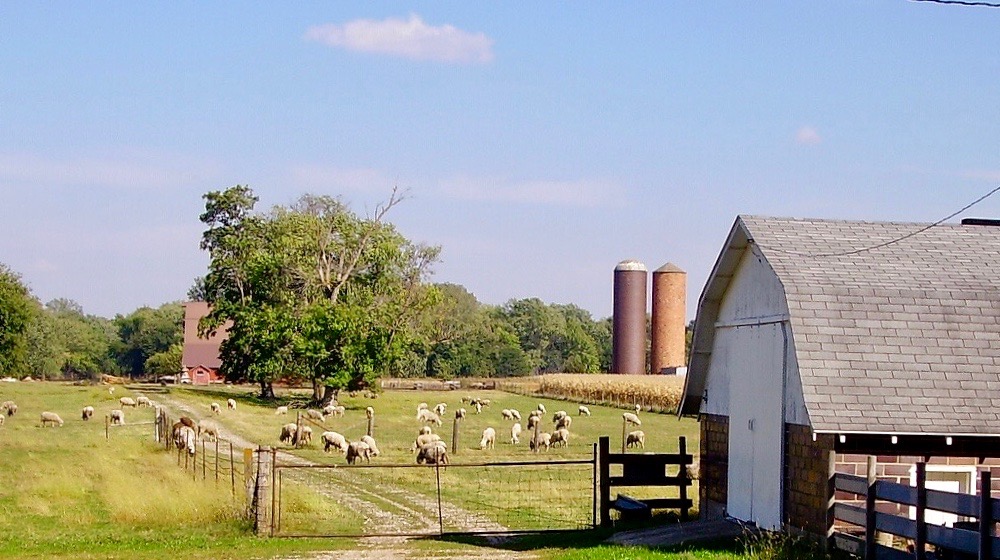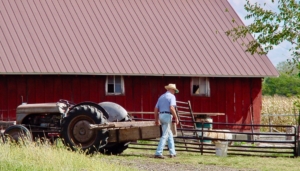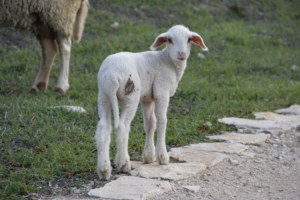John 10:1-10 Story of The Good Shepherd. God’s Story – my story!

I grew up on a farm in Iowa. We were unique farmers; we raised chickens and sheep, not the expected cows and pigs. The sheep spent the day grazing in the timber along the N. Raccoon River. Every evening, after spreading grain in the old wooden troughs near the barn, my dad would lean on the fence and call the sheep. It took only a matter of minutes for the sheep to arrive from hither and yon, and gather in neat rows around the feeders.
I vividly remember one evening, standing beside my father and begging, “Daddy, I want to call the sheep this time … I’ve watched you — I can do it just like you!” Pigtails flying, I pulled tall all five years of me, confidently put my hand on my hips, and yelled, SHE-e-e-e-e-e-e-P. To my surprise and horror, they all went running — in the opposite direction!
I looked up at my father with tears in my eyes, and stammered, “What happened, I sounded just like you?” He gently and simply replied, “I think it is because I feed them. They know my voice.” My 5-year old voice was the voice of the stranger.
It is my understanding that in the time Jesus lived, and in some parts of the world today, the scenario our text depicts was a familiar image. (scroll to MSG version at end) Each day young boys (and today, girls too) would take their family’s flock of sheep onto the hillsides to graze. At the end of the day each shepherd brought their sheep back into the village center and the gate to the village was closed. The sheep co-mingled, they were not separated into family identified pens.
In the morning each shepherd would walk up to the village gate, the gate keeper would recognize the young person, open the gate, and the shepherd would begin to call his, or her, or their sheep. I doubt the shepherd actually named them, like we name pets… “Hey, Bessie, Fuzzy, Matilda, Harry — follow me!” I believe the sheep simply responded to the familiarity of their own shepherd’s voice, like the sheep recognized my dad’s “sheep call.” 
[TRY THIS!] One Good Shepherd Sunday, I invited all the children to come and stand by me in front of the church. I asked them to face the altar with their backs to those in the pews — and not to peak behind them. The children were told to turn around only when they recognized the voice of the one with whom they lived or accompanied them to church that day.
Next I instructed one caregiver for each child to stand (a parent, grandparent, etc). I silently motioned for each adult, one-by-one, to simply call out, “Honey, follow me.” No individual names of a child were to be used.
What do you think happened? Yup, no mis-matches, not a single one! Every single child turned around only when they heard the voice of the adult who loved them, cared for them, and fed them.
Research the past 30-years has repeatedly informed us that the practices and formation of faith primarily takes place in the home — parents, grandparents, and the child’s primary care-givers are the most influential nurturers of the faith.
Would it be a too much of a stretch to say that prior to COVID-19 most of us were more comfortable turning faith formation over to the professional or volunteer at our place of worship? Maybe, just maybe, our own voices were the voices of the stranger? Now, hopefully, home has become church too! (Nods to Dick Hardel & David Anderson of the former Youth & Family Institute/Vibrant Faith and Rich Melheim % FaithInk)
May the text, this Fourth Sunday after Easter 2023, continue to stir us to re-examine and question, “Whose voices do our children hear? Who are the advertisers, promotors, and influencers our youth and we, as adults, follow? Who in our local, national, and global contexts are up to no good — who or what are the sheep stealers?”

Maybe, just maybe, as a result of the pandemic we will no longer be strangers to one another in our own families and neighborhoods. May the vulnerable and those who have been hidden and unappreciated in our society hear our voices — voices accompanied by Christ like, life-giving actions that demonstrate our genuine care and endless generosity.
This Good Shepherd Sunday, may we recognize the voice of Christ calling our names, to re-define abundance and a “better” life for all.
– Linda
Another fond memory from my childhood is the song, I am Jesus Little Lamb. Henriette Louise con Hayn 1784, Public domain. Please sing along…
I am Jesus’ little lamb,
Ever glad at heart I am;
For my Shepherd gently guides me,
Knows my need and well provides me,
Loves me ev’ry day the same,
Even calls me by my name.
Day by day, at home, away,
Jesus is my staff and stay.
When I hunger, Jesus feeds me,
Into pleasant pastures leads me;
hen I thirst, He bids me go
Where the quiet waters flow.
Who so happy as I am,
Even now the Shepherd’s lamb?
And when my short life is ended,
By His angel host attended,
He shall fold me to His breast,
There within His arms to rest.
John 10:1-10 1-5 “Let me set this before you as plainly as I can. If a person climbs over or through the fence of a sheep pen instead of going through the gate, you know he’s up to no good—a sheep rustler! The shepherd walks right up to the gate. The gatekeeper opens the gate to him and the sheep recognize his voice. He calls his own sheep by name and leads them out. When he gets them all out, he leads them and they follow because they are familiar with his voice. They won’t follow a stranger’s voice but will scatter because they aren’t used to the sound of it.”6-10 Jesus told this simple story, but they had no idea what he was talking about. So he tried again. “I’ll be explicit, then. I am the Gate for the sheep. All those others are up to no good—sheep stealers, every one of them. But the sheep didn’t listen to them. I am the Gate. Anyone who goes through me will be cared for—will freely go in and out, and find pasture. A thief is only there to steal and kill and destroy. I came so they can have real and eternal life, [an abundant life] more and better life than they ever dreamed of.” (MSG)

Leave A Comment
You must be logged in to post a comment.